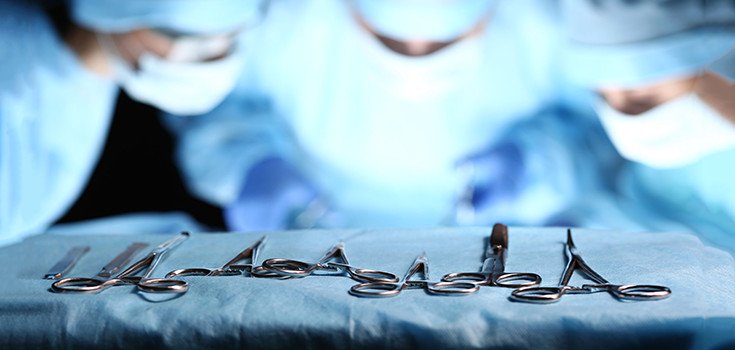Spooky: Alzheimer’s Disease may be Spread Through Surgical Tools
Spooky: Alzheimer’s Disease may be Spread Through Surgical Tools
Could tens of thousands be unknowingly at risk?
A new study suggests the terrifying possibility that Alzheimer’s disease could be transmitted from person to person through some medical procedures.
The studyis small – 8 people – but it’s enough to make researchers question whether contaminated surgical tools might be capable of spreading the “seeds” of the disease, which clog the brain with amyloid proteins and steals the memories of patients. [1]
The participants, adults between the ages of 36 and 51, all died of Creutzfeldt-Jakob disease(CJD) after receiving contaminated hormone injections as children. Autopsies performed on their brains showed that 7 of the deceased patients harbored the proteins that are a hallmark of Alzheimer’s disease. The proteins are unheard of in people of that age group.
Researchers determined those 7 individuals did not have full-blown Alzheimer’s, however, because they did not find the “tau” protein tangles associated with the later stages of the disease. Professor John Collinge, head of neurodegenerative diseases at University College London, says they may have developed full-blown Alzheimer’s eventually, had they not died of CJD.
Here’s where things get scary: the protein “seeds” that eventually lead to the development of Alzheimer’s disease have long been known to stick to metal surfaces. These prion proteinscan withstand extreme sterilization procedures such as steam cleaning and formaldehyde. All of this leads the scientists to hypothesize that the seeds can be transferred between humans, possibly via surgical equipment.
The patients involved in the study died during the 1970’s after being treated with contaminated batches of human growth hormone (HGH) that had been extracted from the pituitary glands of human cadavers. The disease is a neurodegenerative condition caused by an infectious, misfolded protein, or prion, known as PrP. The protein is made “sticky” by the fact that it is misfolded, allowing it to form in clumps in the brain.
Read: 9 Risk Factors Associated with Alzheimer’s Disease
If the researchers’ theory proves to be true, it would mean that tens of thousands of people treated with HGH extracts might be at increased risk for developing Alzheimer’s disease. [1]
“This is the first evidence of real-world transmission of amyloid pathology,” says molecular neuroscientist John Hardy of University College London (UCL). “It is potentially concerning.”
The findings raise questions about the safety of certain medical procedures, such as blood transfusions and invasive dental treatment, which may involve the transfer of contaminated tissues or surgical equipment.
“What we need to consider is that in addition to there being sporadic Alzheimer’s disease and inherited or familial Alzheimer’s disease, there could also be acquired forms of Alzheimer’s disease.
You could have three different ways you have these protein seeds generated in your brain. Either they happen spontaneously, an unlucky event as you age, or you have a faulty gene, or you’ve been exposed to a medical accident. That’s what we’re hypothesising,” Collinge said.
“Certainly there are potential risks in dentistry where it is impacting on nervous tissue, such as root-canal treatments and special precautions are taken for that reason… If you are speculating whether A-beta seeds are transmitted at all by surgical instruments one would have to consider whether certain types of dental procedures might be relevant.”
The U.K.’s health agency was quick to jump into the conversation, reassuring people that the study is small and doesn’t serve as evidencethat Alzheimer’s can be transmitted during neurosurgery or other forms of treatment. On the agency’s website, the NHS said:
“NHS procedures have improved significantly since the 1970s when these patients contracted CJD. Modern surgical equipment used in the UK is very safe and the NHS has extremely stringent procedures to make sure of this.” [2]
Dr. Doug Brown, director of research at the U.K.’s Alzheimer’s Society, said:
“There are too many unknowns in this small, observational study of eight brains to draw any conclusions about whether Alzheimer’s disease can be transmitted this way.”
Collinge acknowledges that more research is needed before any conclusions can be made, and cautions that the research is related to a “specific circumstance of cadaver-derived human growth hormone injections, a treatment that was discontinued many years ago.”
Even if it can be proven that some medical procedures can transfer prion proteins from patient to patient, that doesn’t mean that Alzheimer’s is “contagious.” You cannot “catch” the disease through regular contact with someone who has Alzheimer’s.
| About Julie Fidler: | |
| Julie Fidler is a freelance writer, legal blogger, and the author of Adventures in Holy Matrimony: For Better or the Absolute Worst. She lives in Pennsylvania with her husband and two ridiculously spoiled cats. She occasionally pontificates onher blog. | |
Other Popular Stories:

Post a Comment